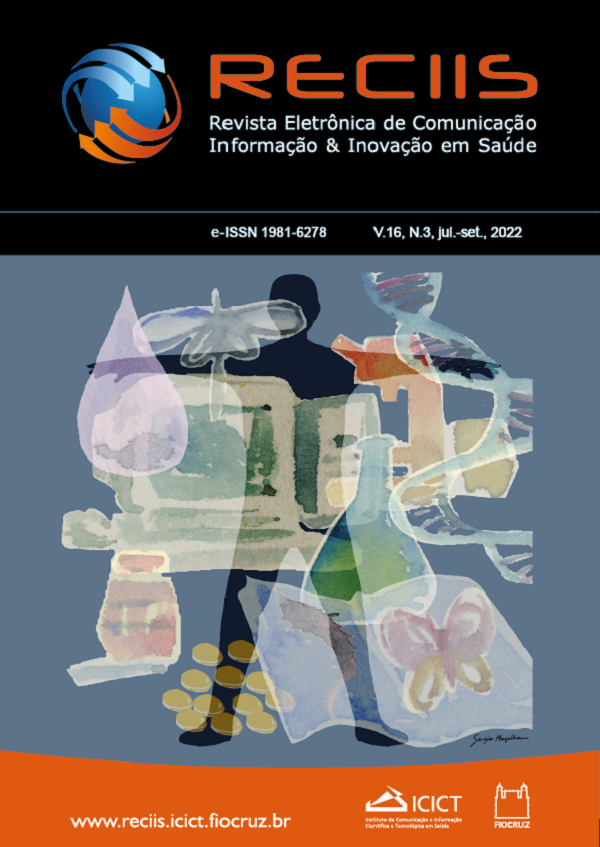When you close your eyes and see: for an affective methodology
DOI:
https://doi.org/10.29397/reciis.v16i3.3299Keywords:
Affections, Affective methodology, Decoloniality, Black literature, BioethicsAbstract
Decolonizing the construction of knowledge is an experience of confronting a way of ‘doing science’ that has become hegemonic in Brazilian universities, centered on Cartesian reason and based on colonial, rigid, and disciplined methods. I present a methodological experience of doing research guided by affections, inspired by the “escrevivência” of the writer, academic and activist Conceição Evaristo. In this article, I will try to expose the methodological flow that took place when I was writing my thesis believing that this was an affective-methodological path. This methodological flow proves to be relevant as it shows another form of knowledge construction, founded on counter-hegemonic bases, namely: the choice of a subjective analysis category (affections) and the development of a subjective analysis; the integration between the person who researches and the researched material; the interdisciplinarity as a way of expanding the look and, therefore, the research; the connection between affections and writing.
References
ANGELOU, Maya. Eu sei por que o pássaro canta na gaiola. Tradução de: Regiane Winarski. Bauru: Astral Cultural, 2018.
CARVALHO, José Jorge de. Encontro de Saberes e descolonização: para uma refundação étnica, racial e epistêmica das universidades brasileiras. In: GROSFOGUEL, Rámon; BERNARDINO-COSTA, Joaze; MALDONADO-TORRES, Nelson (org.). Decolonialidade e pensamento afrodiaspórico. Belo Horizonte: Autêntica, 2019. p. 79-106. (Coleção Cultura Negra e Identidades).
DUARTE, Constância Lima; NUNES, Rosado Isabella (org.). Escrevivência: a escrita de nós: reflexões sobre a obra de Conceição Evaristo. Ilustrações de: Goya Lopes. Rio de Janeiro: Mina Comunicação e Arte, 2020.
EVARISTO, Conceição. Poemas de recordação e outros movimentos. Rio de Janeiro: Malê, 2017.GROSFOGUEL, Rámon; BERNARDINO-COSTA, Joaze; MALDONADO-TORRES, Nelson (org.). Decolonialidade e pensamento afrodiaspórico. Belo Horizonte: Autêntica, 2019. (Coleção Cultura Negra e Identidades).
HABER, Alejandro. Nometodología Payanesa; notas de metodologia indisciplinada (com comentários de Henry Tantalean, Francisco Gil García y Dante Angelo). Revista Chilena de Antropología, Santiago, n. 23, p. 9-49, 2011. DOI: https://doi.org/10.5354/rca.v0i23.15564. Disponível em: https://revistateoriadelarte.uchile.cl/index.php/RCA/article/view/15564. Acesso em: 13 set. 2022.
HOOKS, bell. Tudo sobre o amor: novas perspectivas. Tradução de: Stephanie Borges. São Paulo: Elefante, 2020.JESUS, Carolina Maria de. Quarto de despejo: diário de uma favelada. Ilustração de: Vinicius Rossignol Felipe. 10. ed. São Paulo: Ática, 2014.
KRENAK, Ailton. Roda Viva | Ailton Krenak | 19/04/2021. São Paulo: TV Cultura, 2021. 1 vídeo (92 min). Publicado pelo canal Roda Viva. Disponível em: https://www.youtube.com/watch?v=BtpbCuPKTq4. Acesso em: 08 abr. 2021.
QUEIROZ, Veronica Santana. Qual o lugar dos afetos na Bioética?: percursos e contribuições da literatura negra: um encontro possível com a Conceição Evaristo e a sua obra. 2021. 123 f. Tese (Doutorado em Bioética, Ética Aplicada e Saúde Coletiva) – Programa de Pós-Graduação em Bioética, Ética Aplicada e Saúde Coletiva, Universidade Federal do Rio de Janeiro, Rio de Janeiro, 2021.
SCHUCMAN, Lia Vainer. Entre o “encardido”, o “branco” e o “branquíssimo”: raça, hierarquia e poder na construção da branquitude paulista. 2012. 160 f. Tese (Doutorado em Psicologia) – Instituto de Psicologia, Universidade de São Paulo, São Paulo, 2012.
Downloads
Published
How to Cite
Issue
Section
License
Copyright (c) 2022 Veronica Santana Queiroz

This work is licensed under a Creative Commons Attribution-NonCommercial 4.0 International License.
Author’s rights: The author retains unrestricted rights over his work.
Rights to reuse: Reciis adopts the Creative Commons License, CC BY-NC non-commercial attribution according to the Policy on Open Access to Knowledge by Oswaldo Cruz Foundation. With this license, access, download, copy, print, share, reuse, and distribution of articles is allowed, provided that it is for non-commercial use and with source citation, granting proper authorship credits and reference to Reciis. In such cases, no permission is required from the authors or editors.
Rights of authors’s deposit / self-archiving: The authors are encouraged to deposit the published version, along with the link of their article in Reciis, in institutional repositories.












